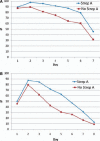Association between use of rapid antigen detection tests and adherence to antibiotics in suspected streptococcal pharyngitis
- PMID: 20201628
- PMCID: PMC3440608
- DOI: 10.3109/02813431003669301
Association between use of rapid antigen detection tests and adherence to antibiotics in suspected streptococcal pharyngitis
Abstract
Objective: Few studies have analysed adherence to antibiotic treatment in pharyngitis. The aim of this study was to evaluate the association of rapid antigen detection tests (RADT) and treatment adherence among patients 18 years of age or over with pharyngitis treated with different antibiotic regimens.
Design: Prospective study from 2003 to 2008.
Setting: Office-based physician practices. Intervention. The adherence of patients prior to the use of RADTs - no test was available until mid-2006 - was compared with the adherence associated with the use of RADTs.
Subjects: Patients with suspected streptococcal pharyngitis.
Main outcome measures: Patient adherence was assessed by electronic monitoring. The adherence outcomes considered were antibiotic-taking adherence, correct dosing, and good timing adherence during at least 80% of the antibiotic course.
Results: A total of 196 patients were recruited. The percentage of container openings was 77.9%+/-17.7%, being significantly higher for patients in whom the RADTs were performed compared with those in whom this test was not undertaken (80.1% vs. 70.8% for thrice-daily antibiotic regimens and 88.1% vs. 76.5% for twice-daily regimens; p < 0.01). The other variables of adherence were also better among patients undergoing RADT in both those who took at least 80% of the pills (71.3% vs. 42.2%; p < 0.001) as well as those with good timing adherence (52.5% vs. 32.8%; p < 0.01). Furthermore, correct dosing was always greater when the patient had undergone an RADT.
Conclusion: Adherence to antibiotic treatment is higher when an RADT is carried out at the consultation prior to administration of antibiotic treatment.
Figures


Similar articles
-
[Compliance rate of antibiotic therapy in patients with acute pharyngitis is very low, mainly when thrice-daily antibiotics are given].Rev Esp Quimioter. 2009 Mar;22(1):20-4. Rev Esp Quimioter. 2009. PMID: 19308742 Spanish.
-
Perceptions and attitudes of French general practitioners towards rapid antigen diagnostic tests in acute pharyngitis using a randomized case vignette study.J Antimicrob Chemother. 2012 Jun;67(6):1540-6. doi: 10.1093/jac/dks073. Epub 2012 Mar 7. J Antimicrob Chemother. 2012. PMID: 22398648
-
Comparison of adherence between twice- and thrice-daily regimens of oral amoxicillin/clavulanic acid.Respirology. 2012 May;17(4):687-92. doi: 10.1111/j.1440-1843.2012.02159.x. Respirology. 2012. PMID: 22390206
-
Acute streptococcal pharyngitis in pediatric medicine: current issues in diagnosis and management.Paediatr Drugs. 2003;5 Suppl 1:13-23. Paediatr Drugs. 2003. PMID: 14632102 Review.
-
Defining the optimum treatment regimen for azithromycin in acute tonsillopharyngitis.Pediatr Infect Dis J. 2004 Feb;23(2 Suppl):S129-34. doi: 10.1097/01.inf.0000112527.33870.0d. Pediatr Infect Dis J. 2004. PMID: 14770076 Review.
Cited by
-
[Introduction of rapid streptococcal antigen test: can its use improve adherence to antibiotic therapy?].Aten Primaria. 2021 Dec;53(10):102102. doi: 10.1016/j.aprim.2021.102102. Epub 2021 Sep 8. Aten Primaria. 2021. PMID: 34507074 Free PMC article. Clinical Trial. Spanish.
-
Antibiotics for acute cough: an international observational study of patient adherence in primary care.Br J Gen Pract. 2012 Jun;62(599):e429-37. doi: 10.3399/bjgp12X649124. Br J Gen Pract. 2012. PMID: 22687236 Free PMC article.
-
Bacterial cultures, rapid strep test, and antibiotic treatment in infected hard-to-heal ulcers in primary care.Scand J Prim Health Care. 2012 Dec;30(4):254-8. doi: 10.3109/02813432.2012.711192. Epub 2012 Oct 10. Scand J Prim Health Care. 2012. PMID: 23050828 Free PMC article.
-
The feasibility of antibiotic dosing four times per day: a prospective observational study in primary health care.Scand J Prim Health Care. 2012 Mar;30(1):16-20. doi: 10.3109/02813432.2012.654196. Scand J Prim Health Care. 2012. PMID: 22348512 Free PMC article.
References
-
- McDonald HP, Garg AX, Haynes RB. Interventions to enhance patient adherence to medication prescriptions: Scientific review. JAMA. 2002;288:2868–79. - PubMed
-
- McCraig LF, Hughes JM. Trends in antimicrobial drug prescribing among office-based physicians in the United States. JAMA. 1995;273:214–19. - PubMed
-
- Kardas P, Devine S, Golembesky A, Roberts C. A systematic review and meta-analysis of misuse of antibiotic therapies in the community. Int J Antimicrob Agents. 2005;26:106–13. - PubMed
-
- Sclar DA, Tartaglione TA, Fine MJ. Overview of issues related to medical adherence with implications for the outpatient management of infectious diseases. Infect Agents Dis. 1994;3:266–73. - PubMed
Publication types
MeSH terms
Substances
LinkOut - more resources
Full Text Sources
Medical
